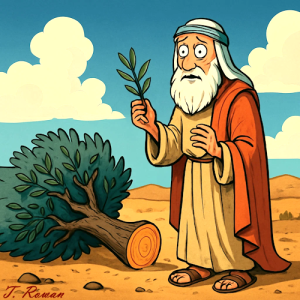God’s Covenant with Israel: Why It Still Matters for the Church Today***
God’s covenant with Israel is more than ancient history — it’s a living promise as enduring as the sunrise. In Jeremiah 33, God ties His faithfulness to the laws of creation, declaring that His commitment to Israel remains unbroken. In a time when Replacement Theology resurfaces and confusion grows within the Church, this truth offers clarity and hope.
Replacement Theology in Disguise
A troubling doctrine has resurfaced — Replacement Theology — now cloaked in more polished language. But the core claim remains: that the Church has replaced Israel in God’s plan. If that were true, what assurance do we have that God won’t revoke His promises to us? If He could abandon Israel, what’s to say that one day He might abandon us? Are our sins today any less evil that the sins of Israel? No because the Word says, “All have sinned and fallen short of God’s glory.” All means all, folks.
Jeremiah answers with divine clarity: “I would no more reject my people than I would change my laws that govern night and day…” (Jer. 33:25-26 NLT). God’s covenant is as fixed as the cosmos.
Cosmic Certainty, Not Poetic Flourish
These verses aren’t metaphorical musings — they’re declarations of divine permanence. God compares His covenant with Israel to the laws of nature. Just as no one can halt the sunrise, no ideology or theology can undo His promises to Jacob’s descendants.
Everlasting Means Forever
This isn’t a one-off Old Testament idea. Genesis 17:7 calls God’s covenant “everlasting.” That doesn’t mean “until Jesus arrives” or “unless Israel messes up.” It means forever. Jesus Himself affirmed the continuity of the Law and Prophets in Matthew 5:17 — not to abolish, but to fulfill.
Critics of modern Israel often cite secularism or political missteps. But Jeremiah anticipated this too: “I will have mercy on them.” Mercy, not merit, sustains the covenant.
Cut Down the Tree to Save the Branch???
God’s faithfulness isn’t performance-based. Israel’s history is full of failure — and restoration. Romans 11:29 declares, “The gifts and the calling of God are irrevocable.” Paul warns Gentile believers not to boast: “You do not support the root, but the root supports you” (Romans 11:18). We’re grafted into the root stock of (Israel) the Olive Tree — not a replacement tree.
What Don’t You Get About Irrevocable?
God’s covenant with Israel has never been based on her performance. Time and again in Scripture, Israel fails, and time and again, God restores. God promises mercy not because of Israel’s righteousness but because of His own faithfulness. “For the gifts and the calling of God are irrevocable,” Paul wrote in Romans 11:29… Irrevocable. Permanent. Eternal.
The Word of God is true and unchangeable. Though he disciplines all of his children our good Father never stops loving them. I reiterate that Romans 11 is Paul’s definitive argument against Replacement Theology. He warns the Gentile believers not to become arrogant, saying, “You do not support the root, but the root supports you” (Romans 11:18). We, the Church, have been grafted into the tree. We have not replaced the tree.
What This Means for the Church
Jeremiah’s words are not just theological but profoundly practical for the Church today. If God can abandon His covenant with Israel, what confidence do we have that He won’t abandon us? If “everlasting” turns out to mean “until further notice,” how can we trust John 3:16 or Romans 8?
Standing with Israel is not about endorsing every political decision of the modern Israeli government. It’s about acknowledging the faithfulness of God to His Word. It’s about aligning with God’s heart and prophetic timeline.
Faithfulness on Display
The rebirth of Israel in 1948, after centuries of exile, is a miracle. No other nation has been scattered globally for nearly 2,000 years and returned with its language, culture, and identity intact. Jeremiah foresaw this: “I will cause their captives to return.”
This isn’t just history — it’s prophecy fulfilled. Like the sons of Issachar, we’re called to discern the times and recognize God’s hand in them.
Grafted In, Not Replacing
To honor God’s covenant with Israel is to honor His Word. To understand His promises to Jacob is to grasp the depth of His mercy. Let’s reject the pride of Replacement Theology and embrace the humility of being grafted in.
Let us pray for peace in Israel, the conversion of both the Jews and Muslims, anticipate the fullness of God’s Kingdom, and hold fast to the truth that His promises — like the sunrise — are unshakable.

